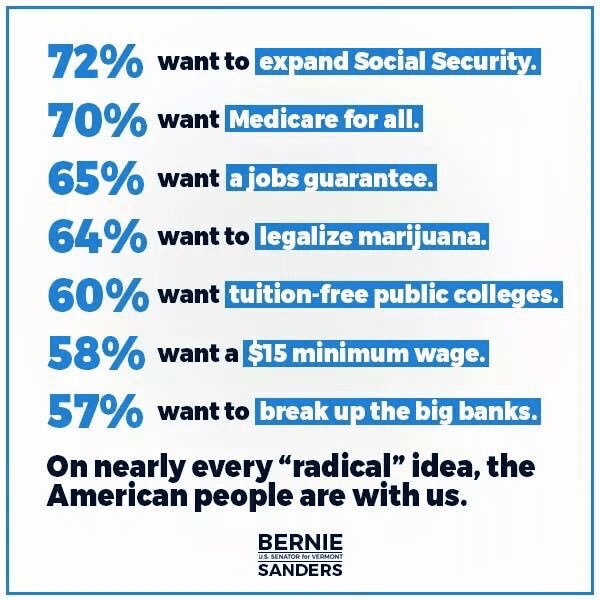Red Bernie Vs. Zombie Reaganism

At TAC, we are a not-for-profit organization, and as such, we are forbidden to advertise or endorse candidates for office. I say that because I’m about to “quote” an ad for Democrat Bernie Sanders. Let me make it clear that I am doing so not because I endorse it in any way — me, endorse a socialist?? — but because I want to analyze it. Here’s the ad:

I don’t know which polls Team Bernie are referencing, but for the sake of argument, let’s say they’re accurate. I don’t know how strong most of those stances will be once it is explained how much realizing those goals will cost the US taxpayer. Everybody loves the idea of a free lunch. A jobs guarantee? Really? The only cost-free items on this list are the marijuana line and the break-up-the-big-banks call.
But I do give Sanders — whose crustiness I really like, personally — credit for audacity.
What he’s not talking about here, though, is the full scale of identity politics goals that he supports. I can’t find his official platform on his campaign website, but here’s a link to a news story talking about the things he’s emphasizing.
This is very smart; there’s not a single identity politics proposal in it. Nothing about abortion, race, sex, immigration or LGBT. The thing is, Bernie Sanders is 100 percent behind the identity-politics left on all those things, with the possible exception of immigration, because as an actual old-school socialist, Sanders knows that you cannot have open borders and a welfare state. He has said in the past that he favors a path to citizenship for most illegal aliens here, which puts him very much on the left.
If I were Bernie Sanders, a democratic socialist, I would be running exactly this kind of campaign — putting identity politics on the back burner. But it amounts to bait-and-switch. Take a look at the website of the Democratic Socialists Of America, the largest socialist organization in the US. Here is their FAQ page. Notice this at the bottom:
Although capitalism will be with us for a long time, reforms we win now—raising the minimum wage, securing a national health plan, and demanding passage of right-to-strike legislation—can bring us closer to socialism. Many democratic socialists actively work in the single-issue organizations that advocate for those reforms. We are visible in the reproductive freedom movement, the fight for student aid, gay, lesbian, bisexual and transgender organizations, anti-racist groups, and the labor movement.
It is precisely our socialist vision that informs and inspires our day-to-day activism for social justice. As socialists we bring a sense of the interdependence of all struggles for justice.
Don’t be fooled: If you vote for Bernie for his economic plans, you’ll get all the pro-abortion, identity politics stuff too. It’s of a piece. Intersectionality, baby.
That said, America is not longing for the same old stale GOP free-market bromides. The fact that a straightforward democratic socialist can be so popular as a presidential candidate is a sign of how much things have changed. Take a look at former TAC editor Daniel McCarthy’s vision for a new kind of conservatism. He writes:
Donald Trump’s rise, and the rise today of an invigorated socialism in the Democratic party, are signs that conventional politics had failed because conventional politics was built upon an economic order that has ended without its advocates even realizing it.
More:
We need a conservative agenda fit for the twenty-first century, and the closest thing to it is in fact the program that follows through on the themes of Trump’s 2016 campaign with greater clarity and focus than the administration itself has so far done. This is not because Trump now defines conservatism, as his detractors allege when they complain about a cult of personality. (Trump has no more of a cult than his last two predecessors did, and less of one among professional conservatives than the deified Reagan.) Rather, Trump in 2016, whether consciously or not, drew upon what has been the clear policy alternative to the elite consensus in favor of global liberalism since the early 1990s: economic nationalism, and nationalism more generally. This is an honorable tradition whose roots in the Republican party run all the way back to Abraham Lincoln. So successful was the economic nationalism pursued by America in the twentieth century that we could afford to deviate from it during the Cold War for the sake of strengthening allies like West Germany, Japan, and South Korea—and even Communist China, an ally of convenience against the Soviet Union. But when the Cold War ended, our economic policy, no less than our foreign policy, should have taken a turn back toward the national interest over building a liberal world order. Trump’s essential appeal to voters was his promise to do just that. He is not an aberration; he is not even a second, more successful Pat Buchanan. He is a return, in however haphazard a fashion, to the policy orientation that once really did make America great and the GOP grand.
Economic nationalism is not just about tariffs. It is less about “economic” than it is about “nationalism”—that is, it takes account of the different needs of different walks of life and regions of the country, serving the whole by serving its parts and drawing them together. In the past, the challenge was to harmonize farmers, urban capital, and labor. The challenge now is to balance those groups with the post-industrial classes as well, and to strengthen the productive economy against the largely fictional economy of administrators and clerks. All of this is for the sake not just of prosperity, in raw dollar terms, but of a national economy that provides the basis for a healthy culture in which citizens and their families can flourish.
Read the whole thing. I can’t possibly do justice to it by quoting extensively. McCarthy’s conclusion is:
America’s fundamental political choice now is between mild nationalism, resurgent socialism, or suicide by liberalism, whether of the libertarian or palliative sort.
Republicans are entirely correct to point out that socialism is not an answer to our problems — and they should also point out that no Democratic nominee can escape the identity politics upon which the Democratic coalition is built. But they should at the same time understand that the “libertarian liberalism” of the free-market fundamentalists is not viable for much longer, for reasons that McCarthy spells out. If the GOP merely yells “Socialism! Eek!” at Bernie, or whoever the 2020 nominee is, the party might succeed, but it will be the triumph of zombies.
Subscribe for as little as $5/mo to start commenting on Rod’s blog.